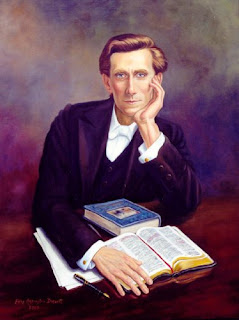The gospel and its evangelical invitation

In his new book, Movements of Grace , Jeff McSwain helpfully emphasizes that... The gospel really is Jesus Christ, not just the benefits he procures for us . He continues: Our salvation is about participation by the Spirit in Christ's own being and in turn in the being of God. "Retrospectively, Christ came to save us form our past sin, from guilt, from judgment, from hell. But prospectively he came to bring us to sonship, to communion with God in the kingdom of God" [quoting J.B. Torrance, Worship, Community and the Triune God of Grace , p62]. It is time in the evangelical comunity for us to consider the advantages of a grace-based evangelism that proclaims the adoption of all persons into the life of God and urges them to participate, by the Holy Spirit, in the relationship they have been given in Christ as the Father's sons and daughters [see Gal 4:4-7 ] (p7, emphasis and links added). Note that he refers to adoption as already accomplished , in Christ, f...



